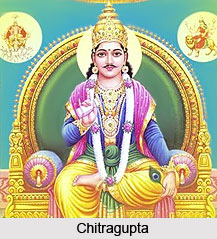 Chitragupta is the Hindu god, who is assigned with the task to keep complete record of deeds of human beings and after their death judge them to send to hell or heaven depending on their actions on earth. In some beliefs Chitragupta is the creation of Lord Brahma and the younger brother of death god, Yama. Lord Brahma created sixteen sons from different parts of his body. Thereafter he created his seventeenth son Chitragupta from his belly. He is also called `Kayastha` as he was created from the Kaya (body) of Lord Brahma. In human form he is one of the divine manifestations. Chitragupta has many sons namely Gorh, Mathur,Bhatnagar, Saxena, Asthana, Srivastava, Ambastha and Karn.
Chitragupta is the Hindu god, who is assigned with the task to keep complete record of deeds of human beings and after their death judge them to send to hell or heaven depending on their actions on earth. In some beliefs Chitragupta is the creation of Lord Brahma and the younger brother of death god, Yama. Lord Brahma created sixteen sons from different parts of his body. Thereafter he created his seventeenth son Chitragupta from his belly. He is also called `Kayastha` as he was created from the Kaya (body) of Lord Brahma. In human form he is one of the divine manifestations. Chitragupta has many sons namely Gorh, Mathur,Bhatnagar, Saxena, Asthana, Srivastava, Ambastha and Karn.
The Hindu religion believes in the life cycle and rebirth. It is thought that those who have misdoings in life have to take rebirth after a punishment period in the hell to complete their life cycle. The primary duty of Chitragupta is to create log of the lives of all human beings. After the death of the creatures Chitragupta judges and decides whether they will attain `Nirvana` or go to heaven for their good-deeds and get redemption from all worldly troubles or receive punishment for their misdoing in another life form or in the hell.
The Kayastha families in India think themselves to be descendant of Chitragupta. They perform Chitragupta Puja or Dawat (inkpot) Puja, in which books and pens are worshipped, indicating the importance of study for the Kayasthas. In Mahabharata the teachings of Chitragupta advocates that men should do virtuous acts as they are rewarded or punished according to their deeds.
Chitragupta came into being after Lord Brahma established the four varnas - Brahmin, Kshatriya, Vaishya and Shudra. He is considered omnipresent and omniscient and is believed to keep accurate records of the actions of all human beings from their birth till death. It is considered that those who worship him would be granted prosperity. His birthday is celebrated on Yamadwitiya. Chitragupta Jayanti is observed as his birthday. Some temples in South India are dedicated to worship of Lord Chitragupta. One of them is located in Kanchipuram in Tamil Nadu.




















